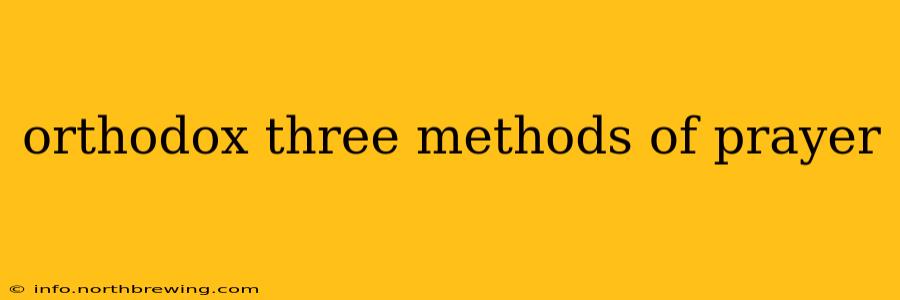Orthodox Christianity places significant emphasis on prayer, viewing it not merely as a ritual but as a vital lifeblood connecting the believer to God. While the forms of prayer are diverse, three methods stand out as central to the Orthodox tradition: Hesychasm, the Jesus Prayer, and the Psalms. Understanding these methods illuminates the rich tapestry of Orthodox spiritual practice.
What is Hesychasm?
Hesychasm, derived from the Greek word "hesychia" meaning "stillness" or "quiet," is a contemplative prayer tradition emphasizing inner stillness and the purification of the heart. It's not a set of rigid rules but rather a path toward experiencing God's presence through profound inner peace. Practitioners seek to quiet the mind and body, creating a space for God's grace to work. This involves a variety of practices, including:
- Posture: Often, a specific posture is adopted, such as sitting or standing upright, promoting physical stillness and attentiveness.
- Breathing: Controlled breathing techniques help calm the mind and body, creating an environment conducive to prayer.
- Mental Focus: The focus is not on reciting words but on cultivating a state of quiet attentiveness, often aided by the repetition of a short prayer or mantra.
Hesychasm isn't merely a technique; it's a transformative journey of spiritual purification, requiring discipline, patience, and guidance from a spiritual father or mother (experienced mentor).
What are some common misconceptions about Hesychasm?
A common misconception is that Hesychasm is solely about achieving a state of complete mental emptiness. While inner stillness is crucial, the aim is not the absence of thought but a purified state of being where God's presence can be experienced. Another misconception is that it’s an exclusively monastic practice. While it has deep roots in monastic traditions, the principles of Hesychasm can be adapted for lay practitioners.
The Jesus Prayer: A Simple Yet Profound Method
The Jesus Prayer, "Lord Jesus Christ, Son of God, have mercy on me, a sinner," is a concise yet powerful prayer repeated continuously throughout the day. Its simplicity belies its depth; repeated with sincerity and focus, it can transform the entirety of one's life. The repetition isn't mechanical; it's an act of constant remembrance and humble petition, keeping the heart turned toward God.
How does one properly practice the Jesus Prayer?
Proper practice involves mindful repetition, focusing on the meaning of the words and allowing them to permeate the heart. It's not a race to see how many times it can be repeated, but rather a journey of constant communion with God. Spiritual guidance is often recommended to ensure proper understanding and practice. It can be practiced during various activities, from work to rest, making it a truly accessible form of prayer.
What are the benefits of practicing the Jesus Prayer?
The consistent practice of the Jesus Prayer can cultivate spiritual growth, leading to increased peace, humility, and a deeper relationship with God. It helps to quiet the mind, reducing stress and anxiety, and cultivates a constant awareness of God's presence.
The Psalms: The Prayer Book of the Church
The Psalms, a collection of 150 sacred songs found in the Bible, form a cornerstone of Orthodox prayer. They encompass a wide range of human emotions, from joy and praise to sorrow and lament. Their poetic language and profound theological insights provide a rich resource for expressing one's relationship with God.
Why are the Psalms important in Orthodox prayer?
The Psalms' universality allows believers to connect with God through diverse experiences. Their lyrical beauty and evocative imagery help to deepen prayer and foster a profound connection with the divine. They're used throughout the liturgical services and private devotions, enriching the spiritual life of Orthodox Christians.
How can one incorporate the Psalms into their daily prayer life?
Individuals can read or chant the Psalms daily, reflecting on their meaning and allowing them to shape their thoughts and feelings. Many Orthodox Christians utilize psalters, books containing the Psalms, often with commentary and guidance.
Conclusion: A Path of Continuous Growth
Hesychasm, the Jesus Prayer, and the Psalms represent three interconnected pathways toward deeper communion with God within the Orthodox tradition. They are not mutually exclusive but rather complementary methods, each offering unique avenues for spiritual growth and transformation. The journey is a lifelong process of prayer, deepening faith, and striving for closer union with Christ. The key is consistency, humility, and guidance from experienced spiritual mentors.
